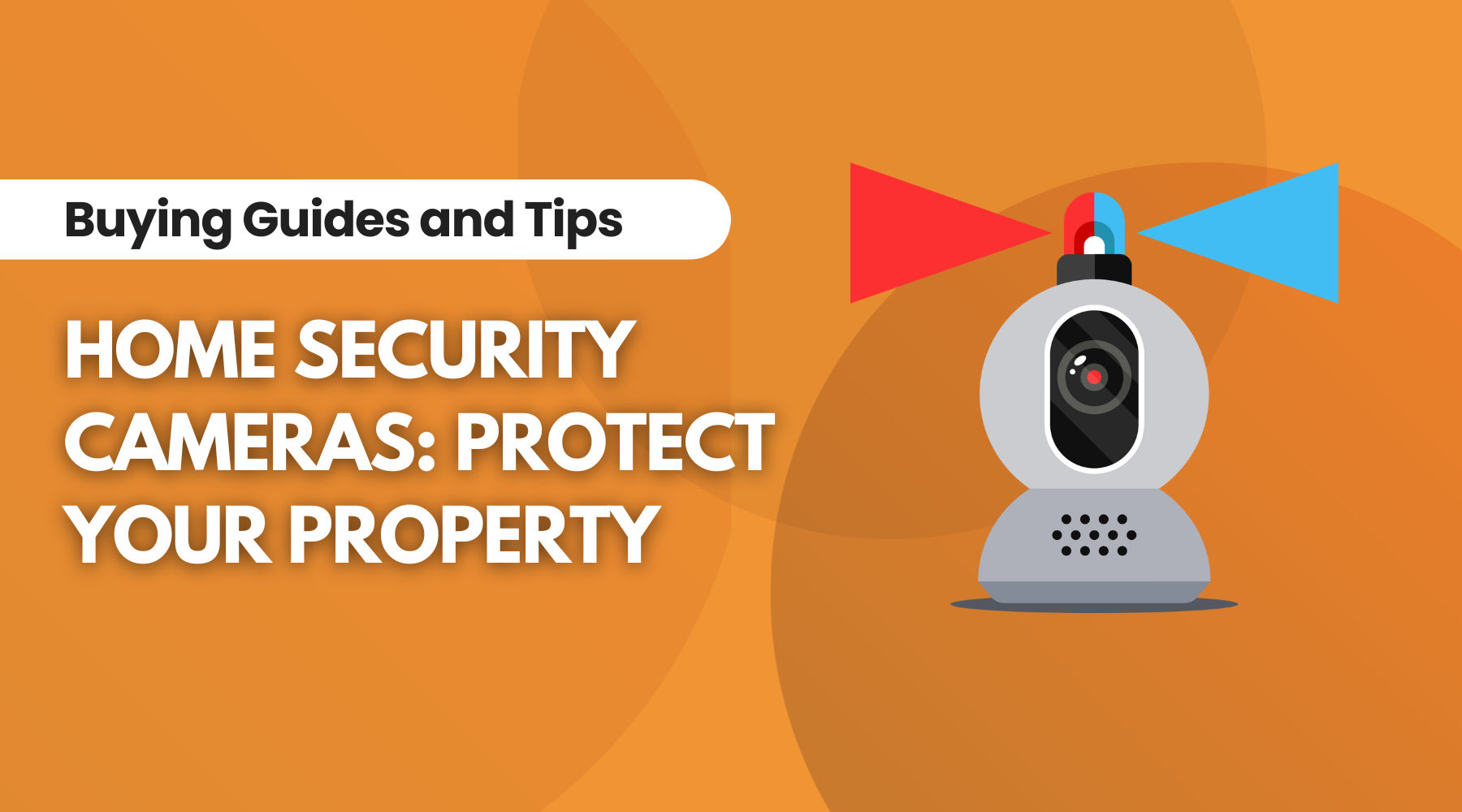
Buying Guide for Home Security Cameras: How to Protect Your Property
Home security is a top priority for homeowners, and the use of home security cameras has become a critical part of protecting your property. In this comprehensive buying guide, we'll walk you through everything you need to know about home security cameras!
Why People Buy Home Security Cameras
Common Reason #1: To Scare Away Thieves
Security cameras make burglars think twice. When they see cameras, they usually stay away, reducing the chances of break-ins.
Common Reason #2: For Proof
Cameras capture evidence if something goes wrong. Good footage helps identify bad guys, support insurance claims, and help the police catch criminals.
Common Reason #3: To Watch Remotely
You can keep an eye on your home from anywhere with remote monitoring. It means you can act fast if something seems fishy.
Common Reason #4: To Keep Kids and Pets Safe
Cameras help parents and pet owners make sure their loved ones are okay, even when they're not at home.
Common Reason #5: To Protect Deliveries
Cameras near your front door stop package thieves and give proof if someone takes your stuff.
Common Reason #6: For Community Safety
In some neighbourhoods, people share cameras to make everyone safer. It's like having extra eyes looking out for you.
Common Reason #7: For Peace of Mind
Most importantly, home security cameras bring peace of mind. Knowing your place is safe 24/7 makes you worry less about safety.
Types of Home Security Cameras
What are Indoor Cameras? Its Advantages and Disadvantages
Indoor security cameras are designed for monitoring the inside of your home. They are typically compact and discreet, blending into your home's decor.
Advantages of Indoor Security Cameras
- Monitoring Indoor Spaces: Indoor cameras are ideal for keeping an eye on your family, pets, and belongings.
- Discreet Design: They are often small and inconspicuous, making them less noticeable to intruders.
- Two-Way Audio: Some models offer two-way audio, allowing you to communicate with people at home.
- Privacy: They are less invasive in terms of privacy concerns compared to outdoor cameras.
Disadvantages of Indoor Security Cameras
- Limited to Indoor Use: They are not suitable for monitoring the exterior of your property.
- Limited Weather Resistance: Indoor cameras are not designed to withstand outdoor conditions.
- Less Deterrent: Their presence may not deter potential intruders as effectively as outdoor cameras.
What are Outdoor Cameras? Let’s Talk About the Pros and Cons!
Outdoor security cameras are built to withstand various weather conditions and are designed for monitoring the exterior of your home.
Advantages of Outdoor Security Cameras
- Exterior Surveillance: They provide coverage of outdoor spaces, including entry points and the perimeter.
- Weatherproof: Designed to withstand rain, snow, and temperature fluctuations.
- Wide Coverage: Many have a wide field of view to cover larger areas.
- Deterrence: Visible outdoor cameras can deter burglars and trespassers effectively.
Disadvantages of Outdoor Security Cameras
- Installation Complexity: Outdoor cameras may require professional installation, especially if wiring is involved.
- Privacy Concerns: Some people might have privacy concerns about outdoor cameras recording public areas.
- Higher Cost: Quality outdoor cameras can be more expensive than indoor counterparts.
What are Wireless Cameras? Benefits and Challenges
Wireless security cameras use Wi-Fi to transmit footage to a receiver or cloud storage. They are known for their flexibility in placement.
Advantages of Wireless Security Cameras
- Easy Installation: They are typically easy to install, making them suitable for DIY setups.
- Portability: You can move them around your property as needed.
- Battery-Powered Options: Many wireless cameras work on batteries, ensuring operation during power outages.
- Remote Viewing: You can monitor your property remotely through mobile apps.
Disadvantages of Wireless Security Cameras
- Battery Life: Battery-powered models need regular battery replacement or recharging.
- Signal Interference: Wireless signals can be susceptible to interference from other devices.
- Limited Range: The distance between the camera and the receiver or Wi-Fi router can be a limitation.
What are Wired Cameras? Its Advantages and Disadvantages
Wired security cameras are physically connected to a power source and a recording device, typically using cables.
Advantages of Wireless Security Cameras
- Reliability: They don't rely on batteries, ensuring uninterrupted operation.
- Continuous Recording: Wired cameras can record 24/7, providing a complete record of events.
- Large Storage Capacity: Wired systems often have ample storage for extended footage.
- Customization: They offer advanced customization options for recording and monitoring.
Disadvantages of Wireless Security Cameras
- Installation Complexity: They may require professional installation due to wiring needs.
- Limited Mobility: The physical connection limits the camera's placement flexibility.
- Cost: Wired systems can be more expensive, considering installation and equipment costs.
Key Factors to Consider in Selecting Home Security Cameras
To assist you in making an informed choice, we'll explore the key features to consider when purchasing a home security camera, catering to various needs and preferences.
Tip #1: Identify the Your Preferred Resolution and Image Quality
Resolution determines the clarity of the video captured by your camera. The higher the resolution, the sharper the image. Common resolutions include 720p, 1080p (Full HD), and 4K.
- 720p: Suitable for general monitoring but may lack detail.
- 1080p: Ideal for most scenarios, providing clear images.
- 4K: Best for capturing fine details, especially in larger spaces.
Tip #2: Know the Cameras’ Field of View
The field of view (FOV) defines the area that your camera can cover. A wider FOV is suitable for larger areas, while a narrower FOV is better for focusing on specific spots.
Tip #3: Consider the Cameras’ Night Vision Capability
Night vision allows your camera to capture clear video in low-light or dark conditions. Look for cameras with infrared (IR) LEDs for effective night vision.
Tip #4: Don’t Forget Motion Detection! It’s an Advantage Though Not Required
Motion detection technology triggers the camera to start recording when it detects movement. Adjust the sensitivity level to avoid false alarms caused by pets or other non-threatening motions.
Security cameras do not necessarily require motion detection, but it is a highly desirable feature for several reasons:
Reduced False Alerts: Motion detection helps cameras distinguish between relevant events (such as a person entering your property) and irrelevant ones (like a tree branch moving in the wind). This reduces the number of false alerts, making it easier to monitor real security threats.
Energy Efficiency: Cameras with motion detection can conserve energy by activating recording or alert notifications only when motion is detected. This extends the life of the camera and reduces data storage costs.
Alerts: Motion detection can trigger real-time alerts to your smartphone or email, allowing you to respond quickly to potential security incidents.
Event Recording: Cameras with motion detection often start recording when motion is detected, ensuring that you capture important events without having to sift through hours of continuous footage.
Customisation: Most modern security cameras offer customizable motion detection settings, allowing you to adjust sensitivity levels and define specific areas of interest. This flexibility ensures that the camera works according to your preferences.
Tip #5: Having Two-Way Audio is a Plus!
Two-way audio enables communication between you and the people on camera. It's useful for remotely addressing visitors, intruders, or even talking to your pets.
Tip #5: It’s a MUST to Identify the Storage Options Available
Type 1: Cloud Storage
Cloud storage securely stores your camera's footage off-site, accessible from anywhere with an internet connection. It ensures your recordings are safe even if the camera is tampered with or stolen.
Type 2: Local Storage
Local storage means saving footage on a physical device like an SD card or a Network Attached Storage (NAS) system. It offers privacy but may risk data loss in case of theft or damage to the device.
Tip #6: Smart Home Integrations are Highly Desirable!
Integrating your security camera with your smart home ecosystem allows you to control and monitor your camera through voice commands or mobile apps. Ensure your camera is compatible with platforms like Amazon Alexa, Google Assistant, or Apple HomeKit.
Tip #7: Identify Your Home Security Cameras’ Power Sources
Type 2: Battery-Powered
Battery-powered cameras offer flexibility in placement, as they don't rely on electrical outlets. However, you must periodically recharge or replace batteries.
Type 1: Wired Power
Wired cameras require a constant power source, ensuring uninterrupted operation. They are suitable for long-term surveillance and don't require battery maintenance.
Tip #8: And of course! How Much is Your Budget?
Before making your final decision, establish a budget based on your requirements and priorities. Keep in mind that while cost-effective options are available, investing in a higher-quality camera may provide better long-term performance and peace of mind.
More on Home Security Cameras: What You Must Learn!


Choosing the right home security cameras involves careful consideration of your specific needs and budget. By understanding the different types, key features, and brands available, you can make an informed decision to protect your property effectively. Enhance your home security today with the right home security cameras!






